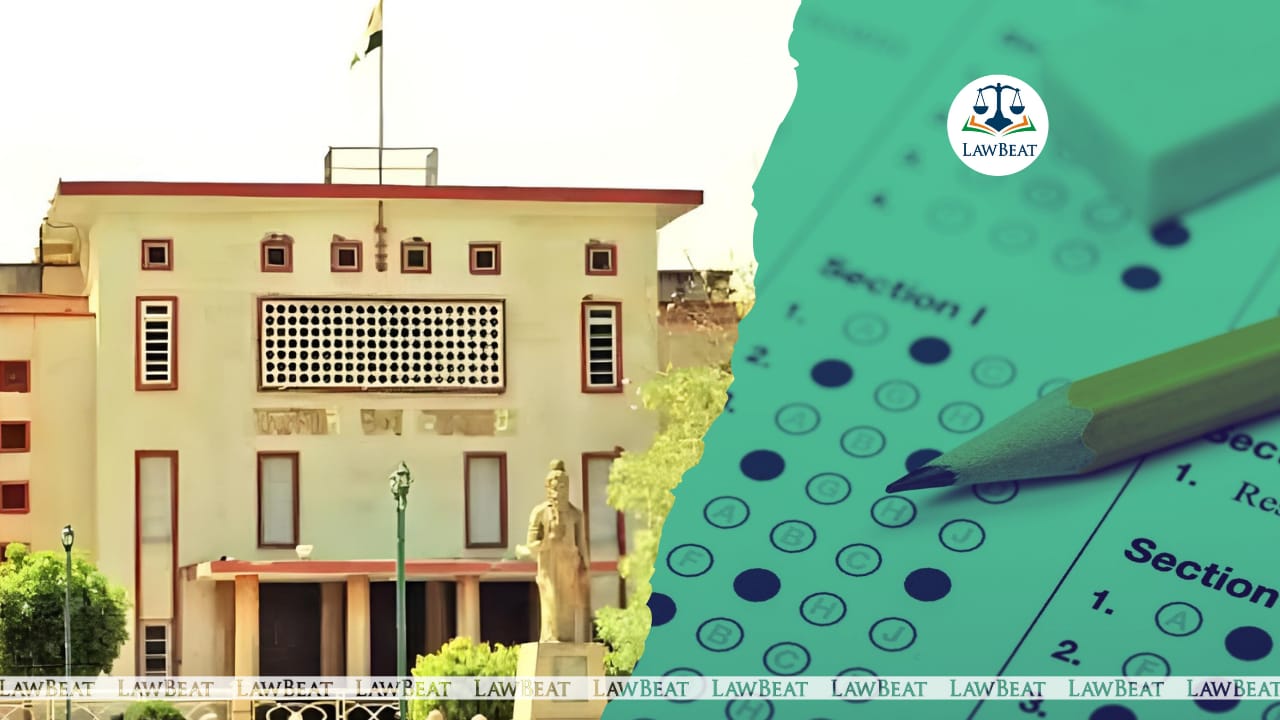Not Releasing Model Answer Key, Calling Objections Violative of Fundamental Rights: Rajasthan HC

The examination was alleged to be biased, unfair and conducted in a non-transparent manner, bypassing the settled provisions of law
The Rajasthan High Court has held that failure to adopt transparent procedures such as not releasing model answer key, inviting objections and formulation of an expert committee, during recruitment for government posts violates candidates’ fundamental rights under Articles 14, 16, and 21 of the Constitution.
A Single judge bench comprising Justice Sameer Jain, emphasised that “it is duty of the exam conducting agency to maintain transparency and fairness in recruitment process in consonance with Articles 14 and 16 of the Constitution of India,” while hearing a batch of petitions filed by aspirants for posts such as Junior Scientific Officer (JSO), Junior Environment Engineer (JEE), and Legal Officer-II. These candidates contended that the recruitment process was opaque, biased, and conducted in haste, resulting in their exclusion from the provisional merit list.
The petitioners argued that public examinations require transparent practices, including providing question booklets and OMR sheets to candidates, publishing provisional answer keys, and addressing objections before releasing a final answer key. It was claimed that these steps were bypassed, particularly since the examination was conducted online. Furthermore, instead of involving the RPSC, the authorities enlisted the Institute of Banking Personnel Selection (IBPS), allegedly rushing the process and compromising fairness.
The court noted: “it can be deduced that at the drop of the hat, the respondents have rushed to conclude the said selection process and the same reflects the malice in law and violation of provisions of RTPP Act and Article 309 of the Constitution of India and other allied provisions.” In furtherance, the court directed the State of Rajasthan, the Rajasthan Public Service Commission (RPSC), and the Rajasthan Staff Selection Board (RSSB) to adhere strictly to the law and Supreme Court precedent in Harkirat Singh Ghuman v. Punjab and Haryana High Court & Ors. The court further ordered the preparation of a fresh merit list within two months.
Notably, the Supreme Court in Harkirat Singh underscored that to ensure transparency and fairness in public objective examinations candidates should be provided with their OMR answer sheets and question booklets after the exam. A provisional answer key must be published, objections invited, and responses with justifications provided by an expert committee. Only after this process should the final score sheet or merit list be released. The court highlighted that “This is one of the mechanisms by which fairness and transparency which is a sine qua non in the public employment can be resorted to.”
The court found the respondents’ approach violated provisions of the Rajasthan Transparency in Public Procurement Act and ignored settled legal precedents, rendering the process unfair. “That albeit the confidentiality of the said examination was maintained, an efficacious, transparent manner as per the ratio encapsulated in Harkirat Singh Ghuman (Supra) was not followed. Moreover, the rules of business were also bypassed along with the provisions of Articles 309-311 of the Constitution of India and the legitimate expectation that is drawn as per Articles 14, 16 and 21 of the Constitution of India,” the court stated.
With regards the candidates already selected, issued appointment letters, and working as probationary trainees, the court directed that they shall not be required to refund any salary or benefits received, nor shall any recovery proceedings be initiated against them. These trainees will continue to serve undisturbed until the impartial outcome of the recruitment process, as directed by the court, is finalized. However, the court clarified that their services shall not be confirmed until the unbiased recruitment outcome is published.
Conclusively, the court directed the respondents to conduct the recruitment process afresh, ensuring compliance with the 1993 Service Rules and the principles outlined in Harkirat Singh. It further clarified that if the directions issued by the court are not complied within the stipulated time, the entire selection process shall be declared “null and void”.
Cause Title: Narpat Surela v State of Rajasthan [S.B. Civil Writ Petition No. 3567/2024]
